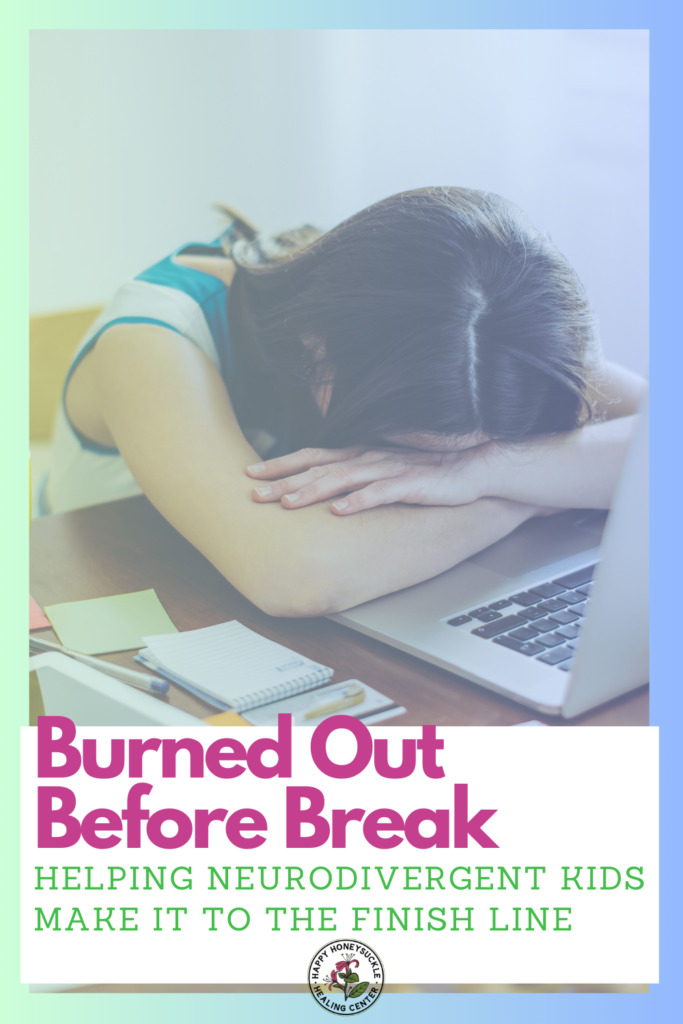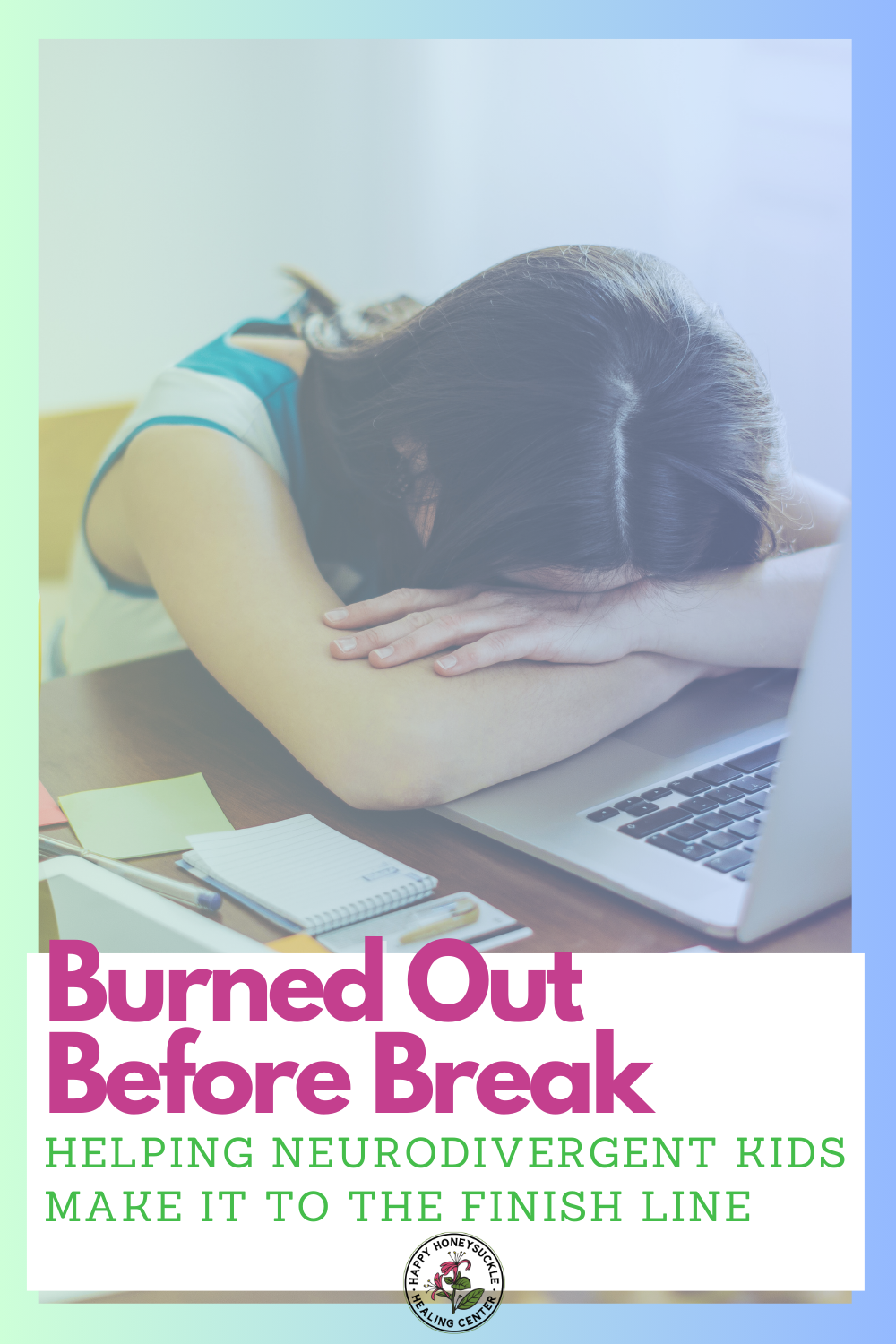Explore effective strategies to manage pre-break burnout in neurodivergent students, with practical tips on coping mechanisms, reducing demands, and planning for breaks. Learn how to support your child’s unique needs and advocate for systemic changes in education.
It’s 2 weeks before the Maryland school system’s spring break, and the breakdowns have begun. I have begun to see extreme signs of burnout in my neurodivergent clients. Kids are curling up in fetal position on the floor. They’ve given up on school. They hate school. They’re behind in all their school work. They’re ace-ing everything, but they’re emotionally exhausted. They are angry. They’re sad. They’re frustrated. They’re overwhelmed.
We will see these signs of burnout again in June as school wraps up.
What Pre Break Burnout Looks Like
Burnout can look different from child to child.
You may see:
- Increased meltdowns or shutdowns, either at school and/or after school
- School refusal or resistance
- Regression in skills (executive function, emotional regulation)
- Physical complaints (headaches, stomachaches)
- Trouble focusing or completing tasks
- Spending more time alone after school.
- Increase in peer issues or issues with siblings.
- Negativity or a poor outlook on life.
Why Neurodivergent Students are Especially Vulnerable
The school system isn’t really built for neurodivergent students. They need to mask to get through their day, something that is exhausting and overwhelming at times, and long stretches of school weeks can be especially hard.
Think about what school entails:
- Sitting still, quietly.
- Being expected to pay attention for long stretches of time.
- Completing work that is too hard or too easy, and not tailored to the individual’s level.
- Turning in completed materials on time.
- Keeping work and supplies organized.
- Limited breaks.
- Expectation to ask for bathroom breaks and movement breaks, and those breaks may be denied or questioned.
- Distractions: Noise from inside and outside of the classroom that increases based on the number of students in the classroom.
- Bringing work home so the understanding that the behavior will be expected to surpass the limit of the school day, often to an unknown amount depending on how much work is assigned and if the student struggles with completing the homework.
- Limited social time, yet the expectation that the student can socially manage peer relationships and communicate effectively.
- Sometimes the environment can be (or feel) chaotic and uncontrolled.
- Social expectations from peers and adults.
- Using executive functioning skills that may not be developmentally appropriate, particularly for kids with neurodevelopmental disorders who lag behind peers in developing these skills.
- Using skills and executive functioning skills that they may not have ever been taught.
Most of the symptoms of ADHD and/or Autism make the school day above EXTREMELY challenging. My opinion is that most students with ADHD and/or Autism are underperforming compared to their true potential if they were in the right environment to support their neurodivergence.
Advocating for Systemic Change
We need to ask and advocate for changes in our system to help support kids. Some schools have begun adopting more recess breaks which can be beneficial. Others schedule their breaks more strategically. Some schools offer year-round schooling with more breaks throughout the year.
I grew up in New Hampshire where our “Spring” break usually came in late February. I think it gave us better timing to break up the school year so we didn’t get as overwhelmed and burned out.
I really like the idea of year-round schooling with more consistent shorter breaks to provide more of a balance for kids. This would help prevent some of the burnout we see in neurodivergent kids, and provide the consistency that can help support success.
What Can We Do for Our Children?
While advocating for change in the school system is helpful, change can be slow and we need to focus on how we can help our kids now.
#1: Expect the Burnout.
- Expect the burnout and plan for it.
- Understand that your child isn’t lazy- they’re burned out.
- Help them count down to break.
- Help them identify things that they’re looking forward to on break… Is it a particular activity? Sleeping in? Being with friends? A special trip?
- Don’t expect perfection… the last couple of weeks can be the hardest.
- Plan your break activities according to what your family can handle. Taking a burned out Autistic child who just needs quiet time to Disney on Day 1 of break is potentially going to result in a not-so-fun experience for the whole family, particularly if that trip lasts until the day before school starts again, you get back at midnight, and kiddo needs to wake up at 6am the next morning to head back to school. This is neurodivergent nightmare fuel.
#2: Reduce Demands
Try to reduce demands at home, after school, and at school if possible.
This may mean not signing up for additional activities after school. This may mean that you allow your child more quiet time, or only do family activities that are sensory-friendly. For example, watching a family movie together might be easier than playing a family board game, or taking a hike together (or the preference may be in a different order, depending on the person).
If you’re a teacher, this means reducing the workload as the break gets closer.
#3: Offer Coping Mechanisms
- Offer coping mechanisms. Leave them laying around where kids will see them, but don’t put on excess pressure for the child to use it.
- Encourage rest and self-care.
- Provide sensory and emotional regulation supports.
- Help students break down large tasks into smaller steps.
#4: Keep weekends low-key.
You need to tailor this to your child. Some children really thrive with more social time and need to have time with friends over the weekends… but others need quiet time. Help your child identify what their needs are, then reevaluate as needed.
I hope this was helpful… in true ADHD fashion, I started this before break and finished it two weeks after break, so I guess this might be more helpful for summer break or maybe next year’s Spring break, but I’m hitting publish before I overthink this.


